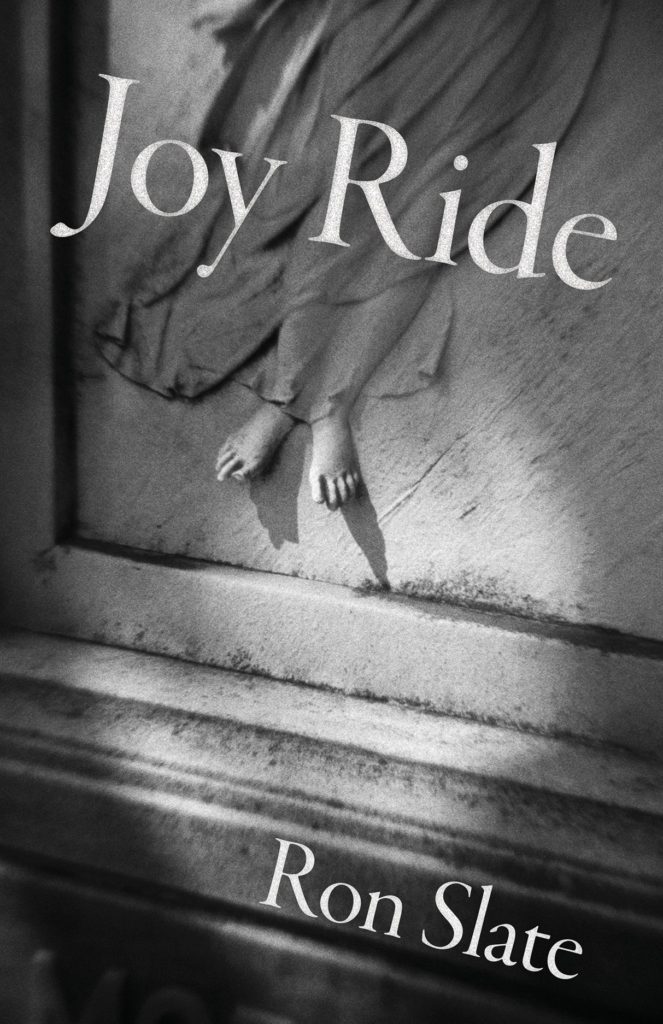Where Things Paused: A Review of ‘Joy Ride’ by Ron Slate
By Peter Mladinic
Posted on
“I contain multitudes”—Song of Myself

A poet of ideas and emotions, Ron Slate comes as close as anyone to the phrase in Roethe’s villanelle, “The Waking,” “we think by feeling.” While his poems embody ideas and convey feelings, they evoke experiences, they are experiences. They are about boats, gulls, travels to Istanbul, to Brazil, to France. They are about family, friends, and acquaintances, doubt, certainty, grief, joy, imagination, baseball, jazz, and drums, also, airports, hospitals, a neighborhood bar, and a joy ride in a black and white (patrol car) with two women. There’s an investment of self and an absence of ego. They evoke solitude and life with others, experiences borne out of passed down stories, memories, and images embedded in thoughts.
Stories passed down, in Slate’s poems, take different forms. Sardent, in central France, is where the poet’s mother and her family “hid for five years” during World War II; and Tblilsi, the capital of the country of Georgia, is birthplace of the poet’s grandmother. Both places are described firsthand. The poet is in both places, in both poems, and in “The Utrillo Is Lost Forever” he says, “I went to Paris for the first time in 1966.” This poem is about a painter and a painting, and Sasha, the poet’s mother’s cousin. “He Decided to Go to Kuzguncuk” is different, a secondhand account of his grandfather’s going from Paris to Geneva to Istanbul and into Kuzguncuk, where the grandfather once attended a grade school “run by German Lutherans.” Slate says, “Maxim told the story…to Serge…who told me…” Closer to home is the story passed down in “Stop-Time.” A tour de force of sound and rhythm, it is set in a cellar, and includes four people: father and son, husband and wife. Its story, passed down from musician to protege, brings to mind a line from “Joy Ride,” the book’s title poem: “memories in the body of the landscape.” Drummer Frank McCabe is at the heart of “Stop-Time.”
Soon he set up his kit next to mine, laying out the opening bars
of “From This Moment On” and I’d play inside him.
That’s how he put, stay inside me and listen with your wrists.
Farther along McCabe says,
Don’t play with your whole arm, it looks cool
but it isn’t. He lit a Winston. Don’t be like a bass player,
use deodorant. Never let a wimp carry your gear.
Listen carefully to the songs you hate most.
The poem concludes:
Verse and chorus, shuffle, bridge, fill, drag, fill, stop-time,
ghost-note. Rumble of the sagging boiler, steam knocking the pipes.
Soon you won’t have to remember, you’ll just make the sound.
Other poems have their basis in memory. “Brother / ICU,” “A Vigil,” “An Argument in the Street,” “After a Sudden Death.” “Anniversary” begins in the future tense and ends in the present, but has embedded a memory of the poet and his bride’s wedding. “Aground” is a memory of camaraderie. “Ask Me Now” juxtaposes a storm’s turbulent upheaval and transformation with the memory’s power to retrieve and transform. Of this power Slate says “But when the blizzard attains its full force, that’s the moment to search/ for the teaspoon lost during the lawn party last summer—/ there it is, with everything else revealed to be buried.” While this poem is about memory, “Joy Ride” is a memory, a first person narrative about fate, being in the right place and at right time, and being “kicked out” of the “black and white” by the two young women who invited Slate into the illicit joy ride. He is “kicked out,” told to leave before the two women are caught, apprehended. Based on that memory, the poem is an exhilarating experience, itself a joy ride of words that fulfills “a craving for anything that lasts longer than a few minutes of escape.”
While the passed-down stories and memories are rife with arresting images, other poems are more idea-oriented, experiences borne of images embedded in thought. Joy Ride is divided into two sections. Most of these idea poems are in the second section. The anecdotal “Naked City” is one such poem, and the very different “The Dangers of Contemplation,” that precedes it, is another. While “Dangers” is open, with its inclusion of gulls in flight over a stadium with no retractable roof, “No Show,” with its images embedded in ideas, is set indoors, in a facility with large-capacity seating and a cash bar. “No Show” appears in the first section. In this poem the poet says “Putting people in chairs/ used to be my job.” Slate has had various job, in each a different identity. The last words in his book are “whoever I am.” In “The Work,” the book’s first poem he says “You had to account for your presence. As if when you show yourself/ the hidden elements don’t exist,” an idea applicable to employees who have worked for employers, also to writers and their readers. What the employer and the reader, benevolent as each may be, cares about is results.
Joy Ride delivers. A few words that resonate are “sealed, concealed, revealed” and “buried.” From depths of the self, Slate unearths what has been buried and unseals what has been concealed. He is clear and direct, in poems that are simultaneously expansive and compact, each a unique experience. Ron Slate’s Joy Ride is well worth taking—original, authentic, and eloquent.
– Peter Mladinic